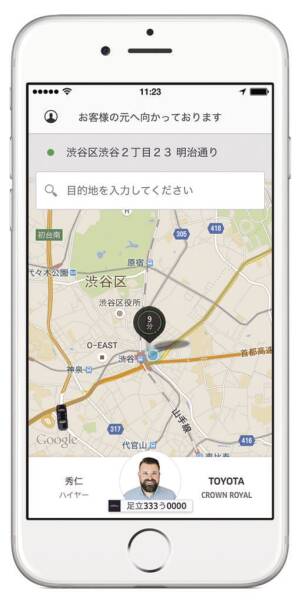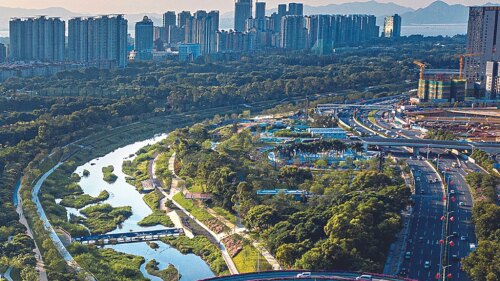Uber is not really in Japan, yet. But Masami Takahashi, president of Uber Japan, is trying to change that. He faces numerous hurdles.
Since its May 2010 launch in San Francisco, the ride-hailing service has moved into more than 400 cities in 70 countries. But it has yet to reach the mainstream in Japan, and it is not guaranteed to ever do so. When the company went online last year in Fukuoka, the biggest city in Japan’s south, it was shut down within a matter of weeks by the government on the grounds that the vehicles used did not belong to Uber, which violated the nation’s Road Transportation Act.
Since 2015, the company’s second attempt to break into the nation of 127 million has involved a different strategy: cooperating with taxi companies. Uber is registered in Japan as a travel agency, acting for commissions as a go-between for customers and taxi companies.
Takahashi, however, is optimistic that a full Uber service will be coming to Japan. “My goal is to get a service up and running around Japan for the Olympics [scheduled for Tokyo in 2020],” he told the ULI Japan Spring Conference. He believes that two issues—dealing with an aging society and an increasing number of tourists visiting Japan—mean Uber has the potential to transform the nation for the better.
On paper, the company’s aims are admirable. Takahashi points out that cities can become “greener, smarter, and more accessible” by getting people to use their cars more effectively.
“Cars, in general, are only utilized 4 percent of the time,” he said. “That means 58 million cars in Japan are not moving, right this second. And to park these cars is taking up anywhere between 15 percent to 20 percent of the city’s urban area. If we could redesign that space, we could use it better; we could make parks for our children to play in.”
In many areas outside Japan’s five or six areas of urban sprawl, space is not so much of an issue. Because the country has a shrinking population growing ever older, many homes are left abandoned as youths head to the cities for their education and careers, leaving relatives behind to fend for themselves. This has caused problems.
“Many seniors are driving themselves perhaps when they shouldn’t be,” Takahashi said. “They are driving when they have to drive. So while the overall number of accidents is coming down in Japan, the proportion caused [by] or involving senior citizens is on the rise. Today, over 20 percent of all accidents involve senior citizens.”
To deal with that, Uber is experimenting with using its ride-sharing technology to allow people to help their older neighbors. Kyotango, a coastal city near Kyoto with a population of about 60,000, will be the first to take part in Uber’s experiment for helping the elderly.
“We will launch a service that matches drivers and riders across the community,” Takahashi said. “It’s a first-of-its-kind project, where we will match local residents with other local residents by providing our technology to a nonprofit organization that will run the service.”
Using tablets or smartphones, people can request rides from their neighbors when they need to go to the store or the hospital, or to run any errand that can become increasingly challenging as a person’s mobility decreases.
“This system has existed under the law, but it hasn’t been utilized too much, in part because manually it would literally take someone behind the scenes sitting with a phone waiting for calls,” said Takahashi. “We can now do it seamlessly using technology.”
Taking a more standard Uber approach to business, Takahashi also said he wants to see the company assist Japan with tourists. He argued that because Japan has a written language difficult to master, a market where credit cards have yet to reach the mainstream, and unique ways of conducting transactions, Uber can help make the country more accessible to those with little experience of life in cities such as Tokyo.
“For Uber last year, we had people from 99 different countries take a trip [using our service] in Tokyo,” he said. “I think that shows the global nature of our service. And a lot of the issues foreigners have coming to Japan are around getting from A to B. Some of this was around communication, and some was around the lack of places you can use your credit card. Using technology, we [the Japanese] can overcome a lot of these issues really simply.”
By embracing technology such as Uber’s, Tokyo could become a more prominent international city. It is currently fourth on the Mori Memorial Foundation’s Global Cities Power Index, which ranks cities based on their attractiveness to creative individuals and business enterprises, but ranks 11th when it comes to accessibility.
“While investment in public transport is important and necessary, we have to get creative to solve a lot of these underserved transportation needs,” Takahashi said. “Can we leverage technology to do so? Can we make use of the 58 million cars sitting idle to better serve the foreigners that come to this country? With technology, we can solve some of these issues without spending a penny of taxpayer money.”
In other countries, Uber has brought convenience, but at a cost. In London, for example, moves are underway to create a labor organization for drivers who believe the company is not paying enough attention to their rights. In Japan, a country where employment laws are weighted in favor of employees to the point of being considered by many to be an economic hindrance, Uber faces a challenge of finding ways to deal with future staff—for example, determining how to discipline drivers.
Takahashi, however, is right to point out that his company’s services would benefit the nation. As the Olympics approach, the city is struggling to become more accessible, and officials are pleading with locals to be more helpful to visitors who may struggle to get around. This surely offers Uber a opening. “We don’t need to wait for flying cars or self-driving cars to solve the issues that we face today,” Takahashi concluded.
Richard Smart is a Tokyo-based freelance journalist who writes on business, society, and the economy.







